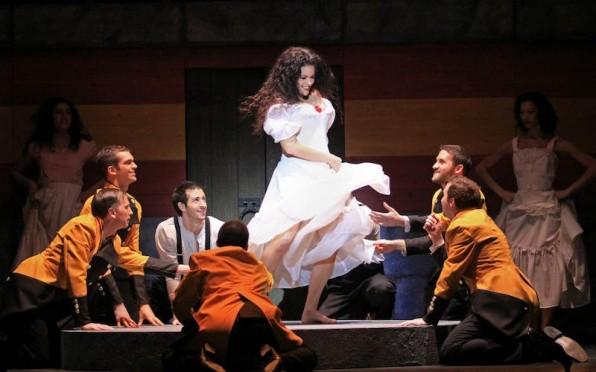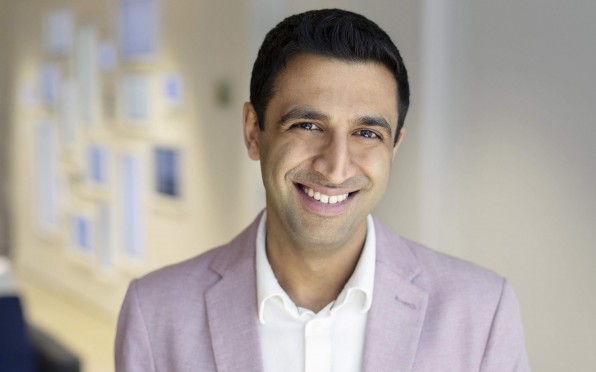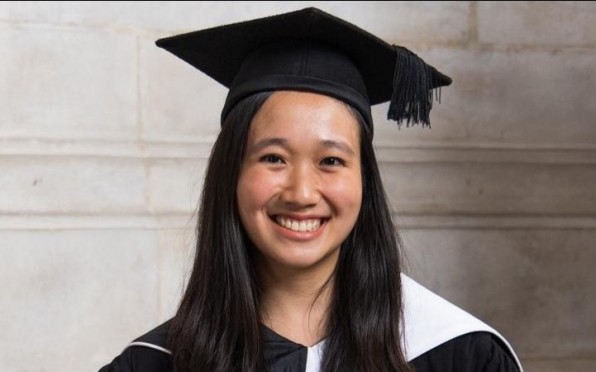Kirstin Chavez (’87)
It’s a long way from playing a workhouse boy in an ISKL Elementary School production of Oliver, to gracing some of the world’s great stages with her renowned Carmen, but mezzo-soprano Kirstin Chavez (‘87) has made her mark in the incredibly competitive world of opera. Opera News magazine described her performance in Graz, Austria as, “the Carmen of a lifetime.”
Kirstin’s parents moved from Colorado in 1977 to teach at ISKL with their young family, including 7-year-old Kirstin. During her
10 years at ISKL, Kirstin performed in a number of musical and other productions, including The Sound of Music and L’il Abner. She was an all-round student, competing in varsity sports and holding Student Council posts, as well as being active in the Thespian Society, Choir and CulCon.
Now Associate Professor and Artist in Residence at the School of Music, University of Utah, Kirstin also shares her passion, skills and experience with aspiring opera performers. Kirstin shared her journey from ISKL to the stage and beyond with ISKL’s Director of Development and Alumni Engagement, Lynette MacDonald.
LM: I’m fascinated to know your journey after ISKL. Did you always dream of being a singer? And what drew you to opera?

KC: When I was 9 years old, I knew that I would be a singer. I had thought that I would go in to musical theater, but when I got to college (New Mexico State University), I was exposed to much more classical music, and I fell in love with that genre of music. I saw an opera for the first time when I was about 19 (“The Barber of Seville”) in which my voice teacher played the lead, and, after that, I was hooked.
LM: What are the biggest challenges of being an opera singer? It’s an art that seems to launch great stars – close to home for me, that’s the likes of Dame Joan Sutherland and Dame Kiri Te Kanawa – but what is it really like as a career?
KC: Finding success as an opera singer is extremely challenging and one must be diligent, persistent and patient. After doing the work and solidifying vocal technique and acting abilities, etc., then one must start on the bottom wrung and try to work up. It is an extremely competitive field and is only now much more so than when I began.
Being a freelance performing artist means that we must live with lots of
uncertainty all the time, we have to adapt as tastes adapt, we have to run our careers as if we were small business owners, we have to take care of our bodies and our instruments and keep in shape so that we can be more marketable, and we have to live with LOTS of rejection along the way. But, when we are on that stage, surrounded by new friends and old, making beautiful music and telling compelling stories, there is nothing else in this life like it.
LM: Your resume shows you have traveled very extensively as a performer – is that one of the joys of your profession? Even when playing the same role (for example your highly praised Carmen) do you find audiences to be different depending on where in the world you are?
KC: I love traveling the world, yes. It is always an amazing adventure, though not always very easy. I relish the challenge of getting dropped off in the middle of a new town where I may or may not speak any of the language, and to find my way around and figure out how to get the things I need and show up ready to go for rehearsal. It is thrilling.
I have especially loved traveling to do my most beloved opera character, Carmen. I know her extremely well, and it is only a joy to bring her to new audiences and to find out how she reacts with new colleagues onstage. Audiences are very different from one place to the next, but they are also remarkably similar. When you do a great job, your audience will tell you so, and it doesn’t matter if they are in Japan or Australia, Europe or the United States.

LM: I’ve been very fortunate to visit a couple of the world’s most renowned opera theatres – La Scala in Milan and the Vienna Opera House – and they are truly beautiful venues. Do you have a favourite performance space?
KC: I have sung in many theaters around the world, all special in their own right. But, I got an amazing thrill from singing at the
Sydney Opera House, and that will always be an especially fond memory for me. It was also thrilling to bring Carmen to the National Centre for the Performing Arts in Beijing, just two years after it opened. And, of course, I thrill every time I get to set foot on the stage at the Metropolitan Opera house (NYC), and I wait, most impatiently, for my next opportunity.
LM: Now, as a teacher as well as performer, what do you hope to instill in your students?
KC: In my students, I expect a very high level of accomplishment. I know extremely well how very difficult it is to be successful as an opera singer, and I know how very competitive it is, and I share this information with my students so that they may understand that, if they wish to succeed, they must give all they have. I also teach them to be much more entrepreneurial than we opera singers have been in the past, so that they can rely on themselves to create their own performing opportunities, and so that they will have an easier time managing their ‘businesses’ than many of my peers have had.
LM: Were there any particular people at ISKL who mentored or encouraged you to follow your passion?
KC: At ISKL, there were many very special people who helped me. Corrie Recter and her family have remained very special in my life—she was my 9th grade geometry teacher. Petra, their middle daughter, is one of my very closest friends to this day, and I have also gone several times to visit Dick and Corrie in the Netherlands. When I came back to Malaysia one time since graduating (in 2007), I stayed with Liesbet Recter and her wonderful family. I was also grateful for the influence of Karen Palko and Mike and Shawna Larios. Al and Jenny Daniels were very important to me, as was Ron Dowty, my 6th grade teacher, and Andre Berly, my French teacher.
I knew most of the teachers better than many students because of the fact that my parents were also teachers there, and because I spent so much of my time at school.
LM: Have you been back to ISKL?
KC: When I got back to ISKL in 2007, and I was astounded to see how much looked so similar to what I remembered from 20 years earlier. It was a time warp, very surreal experience, colored by jetlag, nostalgia and the grief of having recently lost my dad who was so influential at the school. I would love to have occasion to return to see the new campus and revisit all my old haunts.
LM: I love that you continue to make debuts on different stages around the world. Is that because your voice continues to improve as you mature? Where would you love to sing in the future?
KC: The operatic voice matures with age, and tends to become larger which makes it easier to sing different kinds of repertoire. For example, I am now old enough, with a voice mature enough, to sing roles from opera by Giuseppe Verdi, and that is a wonderful thing. I am now, also, beginning to sing more music by Gustav Mahler and even Richard Wagner. So, as an opera singer, it is wonderful to have so much repertoire that you can grow into at various stages of your career. As for opera houses I would like to sing in, I would love to do much more in Europe, and the many famous, long-historied houses there, such as Vienna, Munich, Berlin, Zurich, Madrid, Paris. I would also dearly love to return to sing in Australia, and I would very much love to be able to sing in New Zealand, as well. And, now that Malaysia has a celebrated orchestra of their own (which they did not when I was there), it would be a great dream realized for me to get to return to KL as a professional singer, and to offer my art to the folks who brought me up.
LM: During the Covid-19 pandemic, we’ve seen many people coming together online and trying new ways to reach their audiences. Tell us about any other “lockdown” projects you might have contributed to.
KC: As for singing during the pandemic, well…it has been a great and sad challenge for so many of us. Singing is one of the most dangerous artforms to practice, at the moment, and I have had many engagements cancel since the early spring. But, we must keep working and preparing for the moment when we can return to our passion. I, myself, have done a few things – I offered an aria from Carmen, performed on my rooftop a few weeks ago. Next week, I will record the Wesendonck Lieder, 5 songs by Richard Wagner, which will be featured in the Chicago Humanities Festival this fall. And, we continue to look for ways to share our art while keeping everyone safe. Hopefully, before too long, we will find ourselves back onstage, doing what we love.









